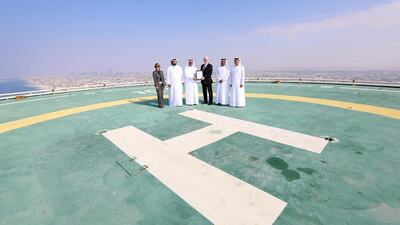DUBAI // The General Civil Aviation Authority has awarded the Burj Al Arab with the first heliport licence in the UAE.
The certification is the first to be awarded as the GCAA works toward achieving improved standards of safety throughout the UAE by phasing in new regulation and guidance material for heliports, including surface- and elevated heliports, and off-shore helidecks.
Implementation of the new rules will be a phased-in, with new construction and operations conforming to the regulations from the outset. Compliance at established heliports will occur over a set period in agreement with the GCAA. However, eventually all heliport operators will be required to hold a Certificate or a Landing Area Acceptance in order to operate or to continue operations in the future.
Prospective Certificate or Landing Area Acceptance holders can visit the GCAA website for access to the e-Services applications process and to obtain the Civil Aviation Regulations and related publications.
“The management of safety has continued to grow over recent years and this proactive approach for the regulatory oversight of heliports reflects a collective effort and prioritisation of safety, which is principle to the GCAA State Safety Programme,” said Sultan Bin Saeed Al Mansouri, Minister of Economy and Chairman of GCAA.
The aim has been to identify locations for the provision of Certification or Landing Area Acceptance and to develop regulation and guidance publications alongside a supportive regulatory oversight regime.
“In the formulation of new GCAA regulations, research has included a review of the International Civil Aviation Organisation publications, which are well known to the aviation sector in the form of Standards and Recommended Practices; a review of the European Aviation Safety Agency publications, and a review of world-wide respected best practises,” said GCAA director general Saif Al Suwaidi.
newsdesk@thenational.ae

